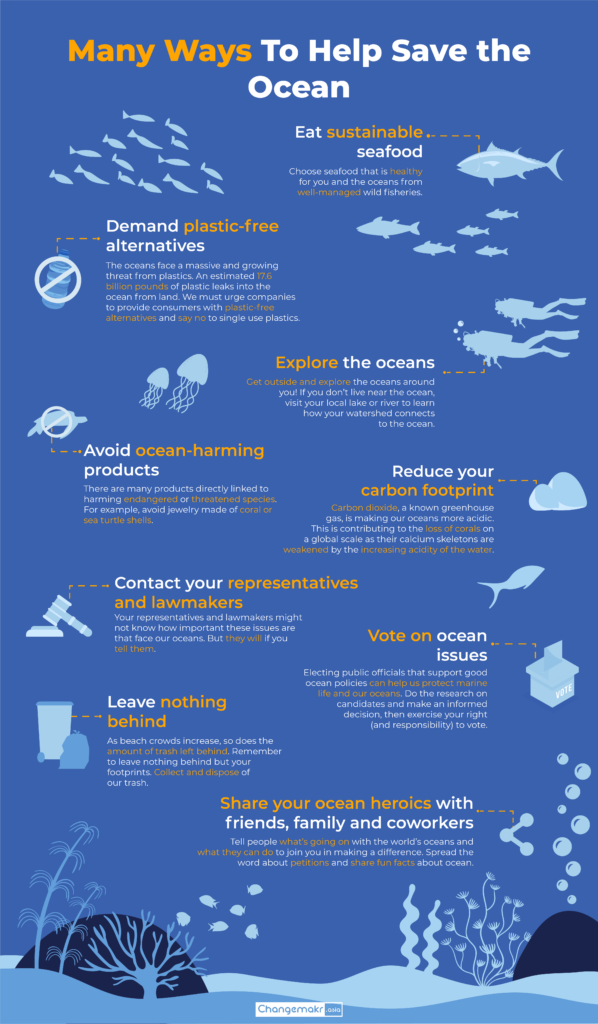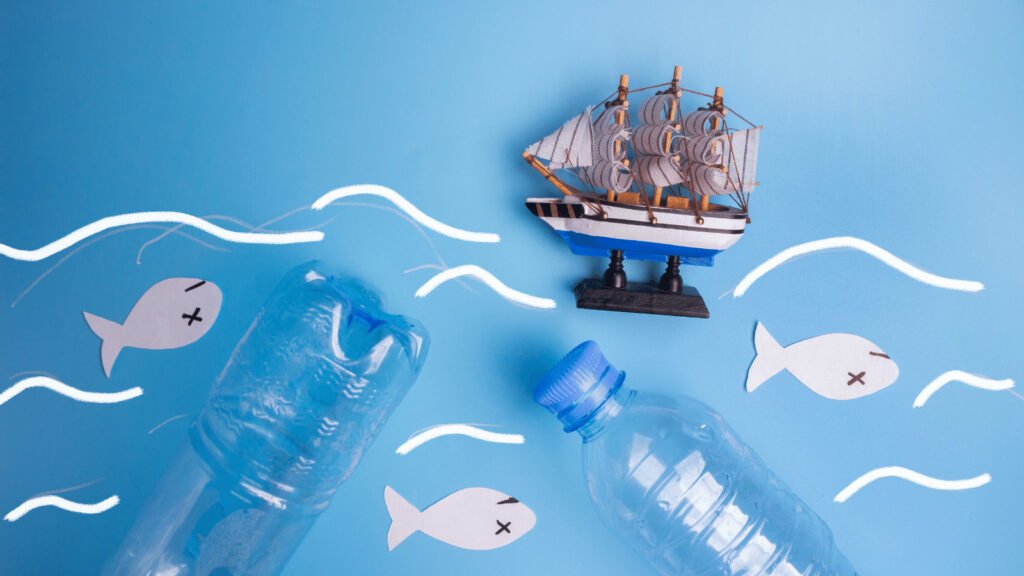Our earth needs help and it starts with choices we make every day !
Oceans cover 71 percent of the planet and are home to important species and ecosystems that we rely on for food, livelihoods, climate regulation and more. In the past 150 years, oceans have been facing numerous pressures from humans including whaling / overfishing, habitat loss, pollution, and climate change.
FIVE SHOCKING FACTS ABOUT PLASTIC POLLUTION IN OUR OCEANS AND WATER SOURCES
The oceans need our help, because :
1. An estimated 17.6 billion pounds of plastic enters the oceans every year.
2. There are approximately 5 trillion plastic pieces weighing 250,000 metric tons afloat in the ocean
3. Experts predict that more than half of sea turtles have eaten plastic debris
4. By 2050, 99% of all seabirds species will have plastics in their digestive tracks
5. Out of all plastic waste ever generated, only 9% has been recycled.
Path To Restore Our Oceans, Our Future
Scientists believe that the world’s oceans could be recovered to healthy levels by 2050, but it would require a substantial shift in the way that we approach business and conservation associated with the oceans.
We can take part in protecting and restoring our oceans via lifestyle choices that we make every day. Here are 10 lifestyle choices we can easily do :
1. Demand plastic-free alternatives
The oceans face a massive and growing threat from plastics. An estimated 17.6 billion pounds of plastic leaks into the marine environment from land-based sources every year—that’s roughly equivalent to dumping a garbage truck full of plastic into our oceans every minute. And plastics never go away!
We must urge companies to provide consumers with plastic-free alternatives and say no to single use plastics such as straws, plastic cutlery, coffee cups, water bottles, plastic bags, balloons, plastic-wrapped produce and take-out food containers.
2. Reduce Your Carbon Footprint
Carbon dioxide, a known greenhouse gas, is making our oceans more acidic. This is contributing to the loss of corals on a global scale as their calcium skeletons are weakened by the increasing acidity of the water.
3. Avoid Ocean-Harming Products
There are many products directly linked to harming endangered or threatened species, unsustainable fishing methods and pollution. For example, avoid cosmetics that contain shark squalene, jewelry made of coral or sea turtle shell, souvenir shells of conchs, nautiluses and other animals, and single-use plastics like straws and water bottles that can end up in our oceans. These products support unsustainable fishing and threaten important species and ecosystems. Learn about mercury’s effects on our water and food, and how we can mitigate them here.

4. Eat Sustainable Seafood
Choose seafood that is healthy for you and the oceans from well-managed, wild fisheries. We know it’s hard to know what fish are okay to eat, which is why you can learn more about eco-certification of seafood.
5. Vote on Ocean Issues
Electing public officials that support good ocean policies can help us protect marine life and our oceans. Do your research on candidates and make an informed decision, then exercise your right (and responsibility) to vote. And don’t let Election Day be the last time they hear from you. Follow up with your candidates and elected officials regularly to remind them of policies you care about.
6. Contact Your Representatives and Lawmakers
Your representatives and lawmakers might not know how important these issues are that face our oceans. But they will if you tell them. It’s up to constituents like you to make lawmakers aware of the crises facing marine life and our oceans. Don’t be shy! Take action with Oceana to directly contact your government representatives and lawmakers.
7. Explore The Oceans
“People protect what they love.” – Jacques-Yves Cousteau
Get outside and explore the oceans around you! If you don’t live near the ocean, visit your local lake or river to learn how your watershed connects to the ocean. There are plenty of online opportunities to explore the oceans, too. Dive into Oceana’s Marine Life Encyclopedia to read fun and interesting facts about all kinds of animals from sharks and seals to octopuses and clownfish.
8. Leave Nothing Behind
As beach crowds increase, so does the amount of trash left behind or blown away. Don’t let your day outside contribute to the destruction of our oceans. Remember to leave nothing behind but your footprints — collect and dispose of your trash.
9. Share Your Ocean Heroics with Family and Friends
Tell people what’s going on with the world’s oceans and what they can do to join you in making a difference. Spread the word about petitions, share fun facts and join the conversation with us on Facebook, Instagram, Twitter and YouTube.
10. Be A Wavemaker and Join Oceana
More than 800,000 members and activists in over 200 countries have already joined Oceana – the largest international organization focused solely on ocean conservation. Together, we’ve won over 200 victories and protected more than 4 million square miles of ocean. But there’s more to be done! Become an Oceana Wavemaker and continue your efforts to help save the oceans.
Got more tips ? Share your thoughts in the comment section below
This article is originally published on oceana.org


